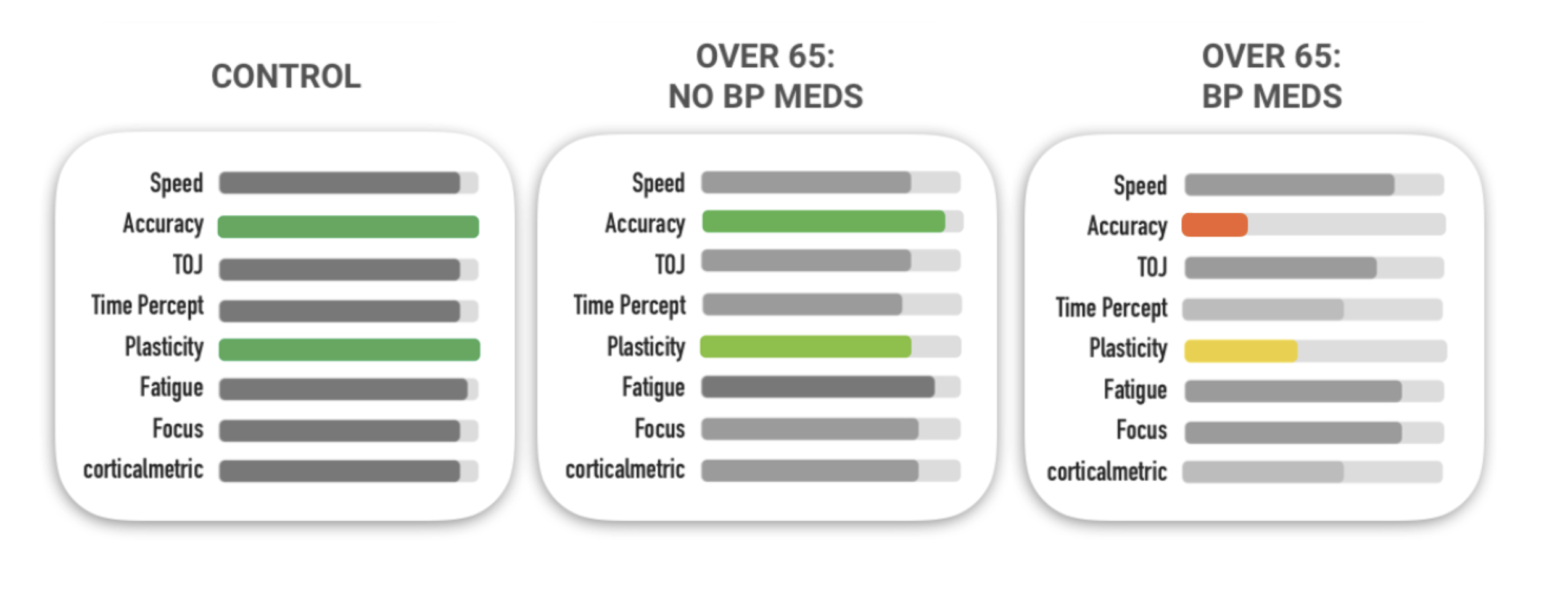Can HRV be used to monitor brain functions like the Brain Gauge?
Many heart medications that improve HRV have a negative impact on brain health that can be measured with the Brain Gauge.
Several people have asked us how heart rate variability (HRV) compares to the Brain Gauge. The question we keep getting is: "Is the HRV measure from my smartwatch as good of an indicator of brain health as the Brain Gauge measures?"
The short answer to this question is no, HRV and Brain Gauge measure completely different things. Heart rate variability gives a measure of the autonomic nervous system (ANS), which is influenced by some parts of the central nervous system (CNS). HRV, or Heart Rate Variability, seems to be a hot topic now since it is a measure that is easily obtainable with a smart watch.
If you are interested in brain health, and the many different mechanisms and brain functions that contribute to overall brain health, then you should probably focus your efforts on making assessments of the central nervous system (CNS). The CNS is made up of the brain and spinal cord. The ANS, which HRV measures, is part of the peripheral nervous system. There is some top-down influence from parts of the brain (like the hypothalamus) that have downstream effects on HRV and some significant changes in brain health can lead to changes in the ANS and consequently HRV. However, you can have changes in the CNS that do not impact the ANS and vice versa.
One of the best examples that demonstrates the difference in the ANS and CNS can be observed in the aging population. One of the first studies that we did was with people over the age of 65. We had already looked at a fairly broad age spectrum (ages 18-65) and found that several key Brain Gauge measures did NOT change with age. In particular, the accuracy and plasticity scores were constant from ages 18 to 65. In other words, brain health in healthy controls at age 60 was just as good as brain health of controls at age 18. So what would happen with older adults? We wanted to find older adults that were physically healthy to see if there was a difference in their accuracy and plasticity scores – scores that clearly remained constant as long as brain health was maintained. To do the study, we recruited individuals from an exercise class at a senior center, all over age 65. Our initial finding was that there was a wide range in the accuracy and plasticity scores which was very different from what we had found in the younger population (ranging from 18 to 65). However, we always collect a medication list from our subjects. When we separated the older population by medication, the data clustered into two groups: those who took heart medication and those who did not. The individuals not taking heart medications scored just as well as the younger healthy control population, but the individuals taking heart medications scored very poorly (about 50% worse than healthy controls). The heart medications that were affecting scores were in a class called beta blockers, which is a medication that is used to improve heart rate variability. From this study, we saw that beta blockers, which are given to have a positive impact on the ANS to better regulate heart rate, could have a negative impact on the CNS. This means that something that is routinely used to improve HRV has a negative impact on Brain Gauge scores.

In the image above, you can see how Accuracy and Plasticity scores were severely impacted by blood pressure medications. A future post will delve deeper into the findings and implications of this study.
There are other examples of when HRV measures are not a good indicator of brain health. At some point in your life, chances are you have met someone that is physically fit but have, to put it gently, sort of lost their minds. My own father was fairly fit - the beta blockers that he was on for over a decade kept his heart running pretty well – even though he didn’t know my name. The few times his dosage was lowered, his cognitive skills seemed to return. If you discuss this situation with health care workers in the geriatric field, you will find the general consensus is that some heart medications tend to make people less brain-healthy. Take them off the medication and their thoughts clear, although now they are at the risk of a heart attack.
So what does this mean? Although many medications have a positive effect on one aspect of physical health, they can also have a negative on another - such as brain health. The downside of the negative effect on brain health is that it alters your own perception of how your brain is doing. Measuring brain health will give you insight into how – and by how much - your brain is impacted by a mind-altering drug. The bottom line is that HRV is fundamentally a very important measure for your overall health and for evaluating your autonomic nervous system, but it is not the best window into your brain health.
